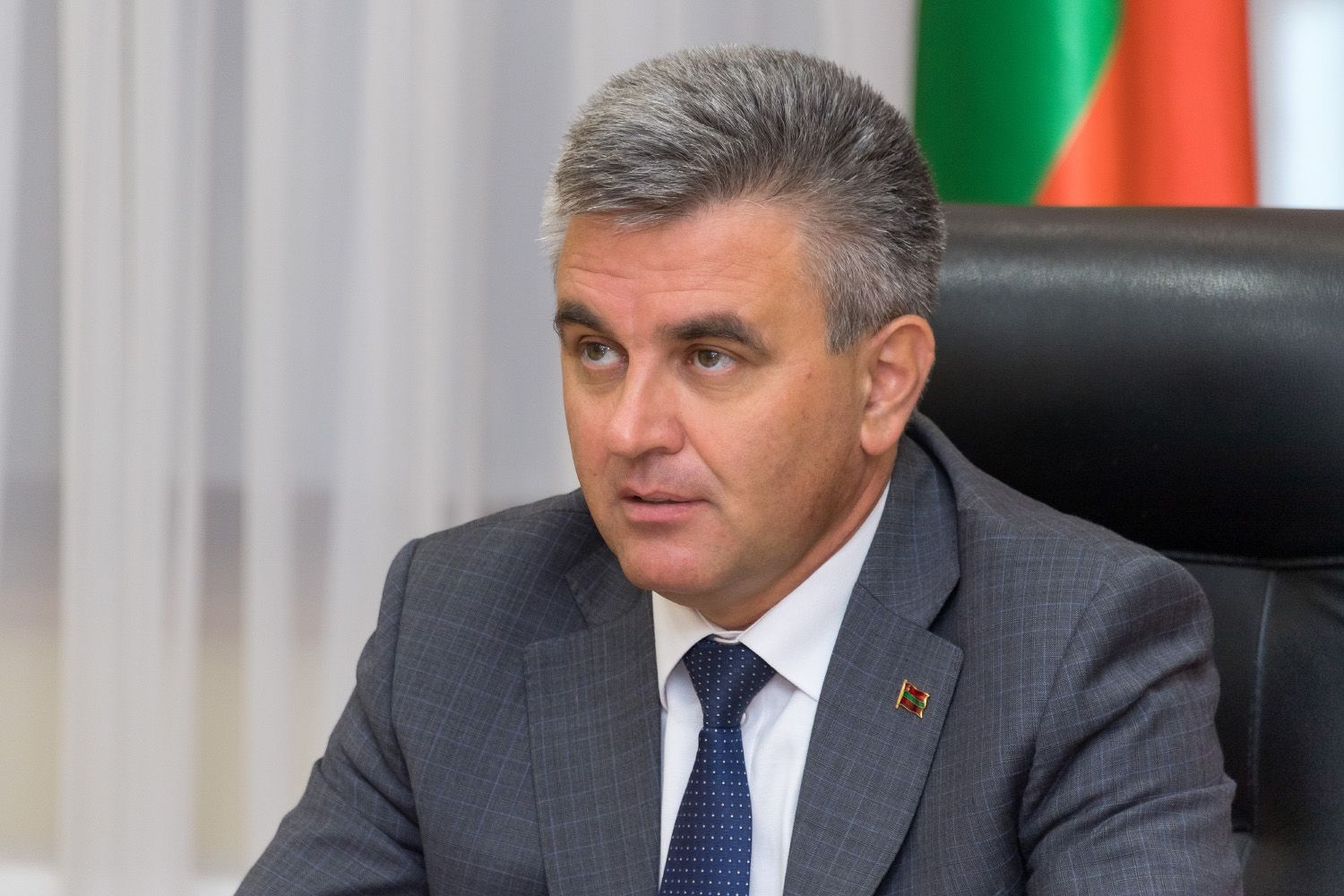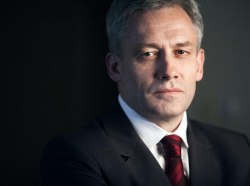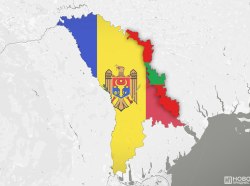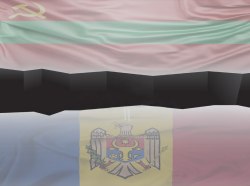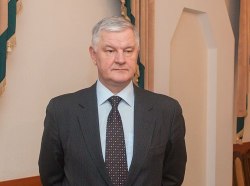- Vadim Nikolaevich, you have had many meetings in Moscow. What topics were discussed during these meetings, what specific agreements were you talking about?
- The agenda is known in principle. The basic component is the negotiation process, its continuation. One of the results is the common opinion of both Russia and Pridnestrovie that the negotiation process should be continued: these are permanent formats of 5 + 2 meeting, these are 1 + 1 meetings, this is the work of political representatives and working groups. This is not a practical result of the agreement between the parties of course, but the fact that we have an opinion and desire to continue working is a fact. The second practical solution is the allocation of the Russian vaccine for Pridnestrovie. The pandemic is growing and growing in many states. This also applies to Pridnestrovie, this applies to Moldova, Ukraine, the Russian Federation, this applies to many European states. One of the most effective ways to fight a pandemic is through vaccinations, which can save lives.
- How much vaccine do you need now? Have you agreed on a specific delivery?
- Yes, we just talked about the volume of 100 thousand doses, this is for 50 thousand people, namely "Sputnik V".
- And when will it be received in Pridnestrovie?
- There are technical nuances, contractual relations and everything else. Nevertheless, we are ready to accept this delivery even tomorrow in principle. Well, I think it will take a week or two.
- That is, in a week or two?
- Yes.
- Under what conditions is the vaccine provided?
- There are different conditions – both gratuitous and reimbursable. We are ready to buy, we are ready to accept free of charge.
- You mentioned the 5 + 2 format for the Pridnestrovian settlement. In what format and when is such a meeting planned?
- You know, we are planning for November. What is “5 + 2” format in general? These are Pridnestrovie, Moldova, Russia, Ukraine, OSCE, USA and the European Union. To date, Sweden is chairing the OSCE, and this meeting is planned for November this year at the site of Sweden, in Stockholm. We have a specific agenda. The meeting should not be for the sake of just a meeting – to get together and talk in a large format. It is important to discuss precisely those issues that are relevant to people's lives.
- If we talk about the agenda, what proposals are you going to make at this meeting?
- You know, in principle, there is no need to reinvent the wheel. The agreement was signed in Berlin in 2016, it has not yet been fulfilled by the Moldovan side. Moreover, five more protocol agreements were signed in the development of this particular "Berlin +" protocol between Pridnestrovie and Moldova, which must be implemented.
- What's the hitch? Why not Berlin+ since 2016, already five years? Maybe return to the "Kozak plan" then, which is even more years old?
- It is not only for us to decide, but to decide for all participants in the negotiation process. But why not "Berlin +", more recent agreements, we should probably ask the Moldovan side. Pridnestrovie has fulfilled all the points for its part and all the obligations assumed. Moldova avoids fulfilling its obligations. Therefore, the task, I think, for the international mediators and observers is to somehow discipline the Moldovan side and urge it to do what they signed. This is the basis of any dialogue, the basis of any agreement. The most important thing is dialogue. Working groups should work in the 5 + 2 format, political representatives should meet, political leaders should meet. It is very bad when a political dialogue turns into a rally. Everyone is talking about desire, but they are marking time, they do not take the first step to achieve the goal, the goal of the negotiations. Live communication cannot be replaced by any world tribune where you can declare a good message, but do nothing. Since July 2019, by and large, the negotiation process has stagnated, and today we are still at the stage of stagnation, there has been no breakthrough.
- What can provide this breakthrough now? Who can influence? You say that the matter is in the position of the Moldovan side, who can discipline them, as you put it?
- First of all, you need a sincere desire to do this. If, for example, political leaders of Moldova talk about human rights, that Moldovan citizens live on the territory of Pridnestrovie, that they want a peaceful solution to the Pridnestrovian issue, then we need to take a step and talk, discuss topics on which the lives of these people depend. What do politicians or officials serve? They work for people. We must make decisions on which the lives of people on the right and on the left bank depend. People need these solutions.
We have a problem with vehicles – Pridnestrovie was blocked on September 1. We have problems with finances, banking services for the citizens of our republic, we have problems with the free movement of citizens, and so on. All these issues are the agenda of both Berlin + and the meetings of the 5 + 2 format in Bratislava in 2019. Due to the fault of the Moldovan side, the final document was not signed. This agenda will also be at a possible Stockholm meeting in November this year.
- What do you expect from the Moldovan side in Stockholm?
- I still look forward to the transition from slogans to negotiations.
- Will they go to the "Berlin +" protocol execution?
- "Berlin +" was signed by the Moldovan side, they just have to fulfill it. I ask you to note that Pridnestrovie, Moldova, Russia, Ukraine, the USA, the European Union and the OSCE as guarantors, mediators and observers of the negotiation process put their signatures under the "Berlin +" protocols. Therefore, by and large, there is someone to ask.
The 5+2 format is a serious organization, where serious states and serious political players are represented. If you are signing a document, your signature must be worth something. Therefore, it is necessary to call on all parties to fulfill their earlier obligations. It's very simple: signed – execute.
- What methods will you use to fulfill the agreements of the Berlin+ package, appeal? But, apparently, appeals no longer work
- Negotiations are these methods, this is diplomacy, this is appeal to common sense. It is necessary to resolve the issues of those who live on the left, right banks. If the Moldovan side does not fulfill its earlier obligations, cannot agree on elementary issues with Pridnestrovie – we are ready for dialogue, we always meet halfway - then what kind of political dialogue can we talk about? It is nevertheless necessary to develop trust between the parties, which is developed when the parties begin to comply with previously reached agreements. Political dialogue is impossible without this. This is common sense, and everyone understands it. We can offer the Moldovan side: if you want to go further, then fulfill what happened before.
- Was the topic of gas supplies to Pridnestrovie discussed at the meetings in Moscow? Will the gas price for Tiraspol remain the same next year?
- We did not discuss the price component in Moscow. The supply will be preserved as I understand, but the price component is a matter of further negotiations.
- In general, what is the current debt for gas? By the way, whose is it – of Moldova or of Pridnestrovie?
- Pridnestrovie uses Russian gas. This amount sounds like seven billion dollars, a huge amount. It consists of the real price of gas supplied to Pridnestrovie. No matter how it is distributed internally, we are talking about world prices. Basically, Pridnestrovie does not give up its debt regarding what has been consumed. This is our position, it is clear and honest. It's not about taking and paying in one day, or a year, or two. The debt process is quite lengthy. The main thing is that there is agreement to do this. We have an agreement.
- Is it possible to transit Russian gas to Pridnestrovie directly through Ukraine? Is such a topic being discussed?
- We have only one pipe - both to Moldova and to us. That is, there is a distribution: to Pridnestrovie and to Moldova. Therefore, the transit is still preserved.
- Isn't there such a topic - to lay a pipe from Russia, through Ukraine, directly to Pridnestrovie?
- What for?
- Then there will be no questions with the Moldovan side.
- No no. This is not a problem, it will not be solved that way.
- That is, it is easier to settle the issue with the debt of Moldova on this topic?
- I think this is a question of negotiations between Moldova and Russia, Gazprom and Moldovagaz. This is a commercial issue. There is no point in laying a pipe. There is a pipe, and there is transit, anyway. I do not know yet about the intention to stop gas transit through Ukraine.
- Pro-Western forces came to power in Moldova. How can you characterize contacts with them? Are the connections established?
- Yes, in general, the pro-Western forces came. There is no disaster for me personally. This is the choice of the people. And the choice of the people must be respected in any case, this is the basis for the further resumption of the negotiation process. To date, only our political representatives have met, that is, from the Moldovan side and from our side. Unfortunately, so far I do not see the desire of the Moldovan side to move forward within the framework of the negotiation format.
- That is, you have no plans to meet with President of Moldova Maya Sandu?
- I am open for dialogue, I am ready to meet with the President of the Republic of Moldova, I am ready to meet with the Prime Minister of Moldova, everything depends on them. We have an agenda. If they have their own agenda, let them set a date, I am ready to meet, please, at least next week. No problem.
- Meeting with the OSCE Special Representative was held in September. Did you hear something new at this meeting in order to push forward the process of the Pridnestrovian settlement?
- Of course, there is a desire of the OSCE to continue the dialogue – in the 5 + 2 format, in the 1 + 1 format, in the working group and so on. As I understand, the OSCE "probed" us to what extent we are ready. We have stated our position, we are ready to sit down and discuss the agenda that we have. We have expressed our opinion in the hope that this dialogue will continue. The OSCE fixed our desire and will continue to work with the Moldavian side.
I have not heard, for example, from the Moldovan side that they do not want to conduct a dialogue, there are no such public statements. There is nothing, thanks to which I would conclude that they are ready to go further and solve the issue or fulfill their earlier obligations at the same time. So far, only statements are like at a rally. This is not a meeting, it is still work. We need to move from rallies to work.
- Returning to Ukraine: how are your relations with Kiev developing now?
- Ukraine is a mediator in the "5 + 2" format, but, unfortunately, I do not see any positive from Kiev today in this area. On the contrary, Ukraine made a decision and blocked the movement of our vehicles from September 1. This would not have happened on September 1, if the Moldovan side had simply fulfilled its earlier obligations. Nevertheless, Ukraine made this decision. This is not a very good step on the part of Ukraine, taking into consideration that approximately 100 thousand Ukrainian citizens live on the territory of Pridnestrovie, who also fell under the restrictions. That is, they hit, among other things, their own citizens, not to mention the citizens of Russia and other states. We receive online applications of citizens who, by the will of fate, found themselves on Pridnestrovian license plates outside Pridnestrovie, in the Russian Federation in particular.
- Did Russia promise at the meetings in Moscow any help in resolving this issue with the ban on vehicles with Pridnestrovian license plates from entering Ukraine?
- First of all, diplomatic assistance was promised. This issue is again included in the format of negotiations. Russia is the guarantor. Russia can again take certain steps to resolve this issue.
- Have you received assurances of such assistance on this issue?
- Sure.
- There are Russian peacekeepers in Pridnestrovie, warehouse in Kolbasna, which, by the way, was mentioned by Maia Sandu in her speech at the UN General Assembly. In your opinion, can the removal of ammunition from this warehouse be used as a compromise in negotiations with Chisinau?
- No. It is impossible to speculate on this. Firstly, the ammunition depot is a question above all of the Russian side. Russia is the owner of these ammunition, and it is necessary to speak with the owner. As for the Pridnestrovian side, after the decision is made, I want to get acquainted with this specific decision because there is a question of safety behind this decision, technological safety, environmental safety. After all, these are not children's toys - ammunition, air bombs. It is necessary to decide whether to take them out or destroy them on the spot. We need expert opinion on what to do. Export? Where to export? If to destroy, how then? After all, there are settlements around. Kolbasna is located four kilometers from Ukraine, there are also settlements. Not everything can be destroyed on the spot, especially air bombs, this is unacceptable. If destroyed on site, recycling plant must be built. It is necessary to come to understanding. Move from slogans to business, understand how. When Russian experts say how, then the local authorities will have to work out the issues of technogenic and environmental safety. If we talk, for example, about export, then where to take? Ukraine, I think, is unlikely to let this cargo through its territory. There are lots of questions. All the same, you must first answer all the questions, and then move on to practical implementation. I hear nothing so far apart from conversations.
- That is, at the moment, such work is not being carried out? Do the experts confer? There is no recycling program?
- Absolutely nothing. Local authorities must ensure security, we are ready to do this. But there are no plans, no algorithms, no solution. The specialists have to work.
- If we return to the topic of Russian peacekeepers in Pridnestrovie. How do the Russian and Ukrainian military, who are also present here, interact?
- Not at all. The basic component is Russian peacekeepers. In addition, there are Pridnestrovian peacekeepers and Moldovan peacekeepers, only military observers from Ukraine. These are not peacekeepers, but military observers. There is the concept of the Joint Military Command, which includes both Russian and Ukrainian military. So they make decisions together. Politics is politics, but here is a mechanism that should work. It works.
- It is known that there is a runway in Pridnestrovie where planes can land, including those from Russia. Is the issue of resuming flights with Russia not being discussed now?
- We have a runway, of course, it is a military airfield that can accommodate any aircraft, of any tonnage. This question is political, not technical. That is, someone must provide a corridor, in this case, either Ukraine or Moldova. But if Russian aircraft do not fly through Ukraine at all, this is probably out of the question. Then Moldova. But whether Moldova will give a corridor is already a subject of negotiations between Russia and Moldova.
- How do you look at these prospects?
- I would look at them positively if it was politically possible. Technically, we are ready to provide all the possibilities for the operation of this airfield today.
- You have recently registered as a candidate for the PMR President for the elections in December. In case of victory, will the course in relations with Russia change?
- We have the Development Strategy for eight years, which was approved on December 12, 2018. Our state idea is indicated there, which consists of three points. The first point is precisely the strengthening of the independence of the Pridnestrovian Moldavian Republic and the implementation of the 2006 referendum, at which the people spoke for the independence of Pridnestrovie and for unity with Russia. This vector will be saved: it is the people's choice. Only the people can change the choice of the people. The president is like an electro-conductor of the people's choice, this is normal.
- Have you turned to the Russian authorities with a request to recognize Pridnestrovie?
- I personally did not, my predecessors did it. The referendum was held in 2006, and 97% of citizens voted in the referendum to join the Russian Federation. This is again a political component. You have to be ready for recognition. Here we are ready for recognition: we are a state with all branches of Government, with our own currency, with our economy, with our finances. The issue of recognition is a technical issue. The question, in principle, is not about us.
- When you run for the second presidential term, will you apply?
- You know, I'm not a populist and shouldn't just urge to recognize us. This is a serious question. Even conversion is a serious step. Therefore, I will first discuss all these serious issues, and then declare. If the situation develops, then, of course, yes.
- The last question is about sports. Pridnestrovian "Sheriff" showed itself at a high level, passed to the main European tournament – the Champions League. What is the secret of such football success?
- Probably the secret in coaching is first of all: Mr. Vernidub is in his place. He is from Ukraine, but now coaches our football club “Sheriff”. This is both his merit and the merit of those who play in the club. I see the team and see their desire to win, which they realize. Of course, if we talk about the rating of teams in terms of financial condition, the “Sheriff” team is very inferior to those rivals over whom it has already won. The match with “Real Madrid” is ahead (next week). This is a very interesting match. “Real Madrid” is showing good results. Then “Sheriff” will play with “Inter Milan”. This is also a serious team. After that we will host these clubs in Tiraspol. Participation of “Sheriff” in the group stage of the Champions League is an example to others of how one can play, and most importantly, have a desire to play – for not so fabulous financial resources.
- How do you motivate the players to play well? It turns out, not a salary?
- They, of course, receive a salary. Probably, happiness is not only in money. In addition, these young people want to prove themselves, show the whole world and play further, at a completely different level.
- What would you advise, for example, to Russian footballers, so that they perform as well as Pridnestrovian ones?
- I would like to advise Russian footballers to love Motherland and defend it on the football field. That's all.

